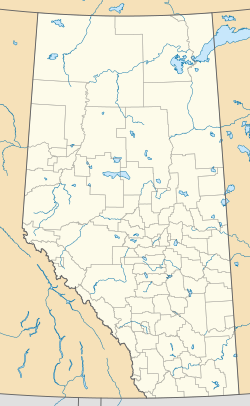Bonnyville | |
|---|---|
Town | |
| Town of Bonnyville | |
 Grain elevators, 1974 | |
| Motto: It's Multi-Natural | |
 Location in the MD of Bonnyville No. 87 | |
Location of Bonnyville in Alberta | |
| Coordinates: 54°16′05″N 110°43′49″W / 54.26806°N 110.73028°W | |
| Country | Canada |
| Province | Alberta |
| Region | Northern Alberta |
| Planning region | Lower Athabasca |
| Municipal district | Municipal District of Bonnyville No. 87 |
| Incorporated[1] | |
| • Village | September 19, 1929 |
| • Town | February 3, 1948 |
| Government | |
| • Mayor | Elisa Brosseau |
| • Governing body | Bonnyville Town Council |
| • MP | Shannon Stubbs (Conservative)—Lakeland |
| • MLA | Scott Cyr (United Conservative Party) — Bonnyville-Cold Lake-St. Paul |
| Area (2021)[3] | |
| • Land | 14.17 km2 (5.47 sq mi) |
| Elevation | 564 m (1,850 ft) |
| Population | |
| • Total | 6,404 |
| • Density | 452.1/km2 (1,171/sq mi) |
| Time zone | UTC−7 (MST) |
| • Summer (DST) | UTC−6 (MDT) |
| Forward sortation area | |
| Area codes | +1-780, +1-587 |
| Highways | Highway 28 Buffalo Trail |
| Waterways | Moose Lake Beaver River |
| Website | Official website |
Bonnyville is a town situated in East Northern Alberta, Canada between Cold Lake and St. Paul. The Municipal District (MD) of Bonnyville No. 87 surrounds the community.
The community derives its name from Father Bonnin, a Roman Catholic priest.[6]
- ^ "Location and History Profile: Town of Bonnyville" (PDF). Alberta Municipal Affairs. October 7, 2016. p. 78. Retrieved October 11, 2016.
- ^ "Municipal Officials Search". Alberta Municipal Affairs. 2019-05-09. Retrieved 2021-10-01.
- ^ a b Cite error: The named reference
2021censuswas invoked but never defined (see the help page). - ^ "Alberta Private Sewage Systems 2009 Standard of Practice Handbook: Appendix A.3 Alberta Design Data (A.3.A. Alberta Climate Design Data by Town)" (PDF) (PDF). Safety Codes Council. January 2012. pp. 212–215 (PDF pages 226–229). Archived from the original (PDF) on October 16, 2013. Retrieved October 8, 2013.
- ^ "Population and dwelling counts: Canada and population centres". Statistics Canada. February 9, 2022. Retrieved February 13, 2022.
- ^ Place-names of Alberta. Ottawa: Geographic Board of Canada. 1928. p. 22.


